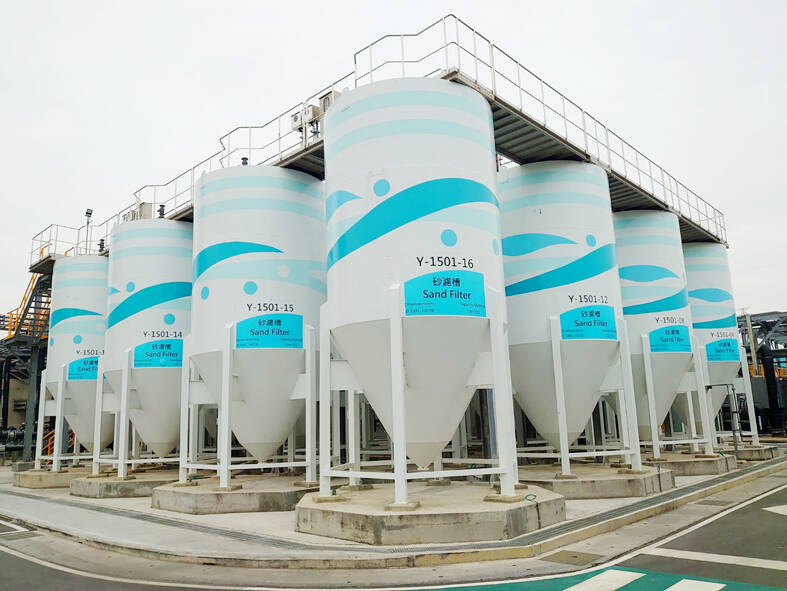Taiwan Semiconductor Manufacturing Co (TSMC, 台積電) yesterday reiterated its plans for comprehensive water treatment and recycling facilities in Arizona, following reports that it could get mired down in “water politics” in the drought-affected US state.
TSMC said in a statement that it plans to construct a water recycling facility to meet the needs of its advanced wafer fabs in Phoenix, adding that it would also build a comprehensive wastewater treatment system to reduce consumption and increase efficiency.
The statement came after the US-based weekly Barron’s on Friday reported that TSMC might need to compete with agricultural users and Native American tribes in Arizona for access to water.

Photo: CNA
The report said Intel Corp’s advanced fabs in Arizona are expected to place additional pressure on TSMC’s water supply.
Citing an estimate from Phoenix officials, the report said TSMC could require up to 40,000 acre-feet (49 million cubic meters) of water a year if it builds six fabs as reported by foreign media, enough to supply 160,000 homes.
TSMC said it has been in contact with Phoenix officials since the initial planning stages of its fabs to ensure that it has sufficient water supplies.
TSMC in December last year said it would expand its investment in Arizona to US$40 billion from the original US$12 billion.
The company is to build a 4-nanometer and a 3-nanometer fab in the state, with the former expected to start mass production next year and the latter in 2026.
TSMC said that, to its knowledge, the authorities in Phoenix are keen to invest in water-related infrastructure to create a sustainable supply.
Phoenix, which can draw on water sources including the Colorado River, the Verde River, the Salt River and underground aquifers, has been designated by the state of Arizona as having a 100-year supply of water, TSMC said.
The company said wastewater released from its facilities would adhere to standards higher than those required by Arizona regulations.

UNCERTAINTY: Innolux activated a stringent supply chain management mechanism, as it did during the COVID-19 pandemic, to ensure optimal inventory levels for customers Flat-panel display makers AUO Corp (友達) and Innolux Corp (群創) yesterday said that about 12 to 20 percent of their display business is at risk of potential US tariffs and that they would relocate production or shipment destinations to mitigate the levies’ effects. US tariffs would have a direct impact of US$200 million on AUO’s revenue, company chairman Paul Peng (彭雙浪) told reporters on the sidelines of the Touch Taiwan trade show in Taipei yesterday. That would make up about 12 percent of the company’s overall revenue. To cope with the tariff uncertainty, AUO plans to allocate its production to manufacturing facilities in

Taiwan will prioritize the development of silicon photonics by taking advantage of its strength in the semiconductor industry to build another shield to protect the local economy, National Development Council (NDC) Minister Paul Liu (劉鏡清) said yesterday. Speaking at a meeting of the legislature’s Economics Committee, Liu said Taiwan already has the artificial intelligence (AI) industry as a shield, after the semiconductor industry, to safeguard the country, and is looking at new unique fields to build more economic shields. While Taiwan will further strengthen its existing shields, over the longer term, the country is determined to focus on such potential segments as

TAKING STOCK: A Taiwanese cookware firm in Vietnam urged customers to assess inventory or place orders early so shipments can reach the US while tariffs are paused Taiwanese businesses in Vietnam are exploring alternatives after the White House imposed a 46 percent import duty on Vietnamese goods, following US President Donald Trump’s announcement of “reciprocal” tariffs on the US’ trading partners. Lo Shih-liang (羅世良), chairman of Brico Industry Co (裕茂工業), a Taiwanese company that manufactures cast iron cookware and stove components in Vietnam, said that more than 40 percent of his business was tied to the US market, describing the constant US policy shifts as an emotional roller coaster. “I work during the day and stay up all night watching the news. I’ve been following US news until 3am

COLLABORATION: Given Taiwan’s key position in global supply chains, the US firm is discussing strategies with local partners and clients to deal with global uncertainties Advanced Micro Devices Inc (AMD) yesterday said it is meeting with local ecosystem partners, including Taiwan Semiconductor Manufacturing Co (TSMC, 台積電), to discuss strategies, including long-term manufacturing, to navigate uncertainties such as US tariffs, as Taiwan occupies an important position in global supply chains. AMD chief executive officer Lisa Su (蘇姿丰) told reporters that Taiwan is an important part of the chip designer’s ecosystem and she is discussing with partners and customers in Taiwan to forge strong collaborations on different areas during this critical period. AMD has just become the first artificial-intelligence (AI) server chip customer of TSMC to utilize its advanced